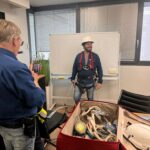-
- Developing and generating for our planet
- Doral’s Contribution to Reducing Emissions and Addressing for Climate Change
-
Innovation
Full chapter- Innovation
- A Leader in Israel’s Energy Storage Sector
- Doral Tech – Energy of Innovation
- A Bridge to Academia and Future Technologies
- Leading the Field of Dual-Use Renewable Energy Production in Israel
- Development of ‘Green Hydrogen’ Projects
- Development and Management of Environmental Infrastructure Integrated with Renewable Energy
- At the Forefront of Israel’s Green Electricity Market
- Reducing Water Consumption
- Preserving Biodiversity
- Waste Treatment and Promotion of Circular Economy
- Our Overall Environmental Impact – Greenhouse Gas Emissions Data
- Progress Against Targets
-
-
- Responsible and Ethical Management of Our Business
-
Corporate Management at Doral
Full chapter - Corporate Governance for ESG
- Business Ethics and Compliance at Doral
- Preventing Bribery, Corruption, and Conducting Internal Audits
- Information Security and Business Continuity
- Risk Management
- Responsibility in Our Value Chain
- Progress Against Our Targets
-

Healthy and Safe Work Environment
0
complaints from employees regarding sexual harassment
0
tolerance for harassment
0
%
of employees completed training on sexual harassment
0
road accidents
0
safety inspections at various work sites
0
Safety conference with 85 contractors, suppliers, service providers, and company employees participating
0
work stoppages resulting from internal inspections among contractors
Doral has zero tolerance for harassment, particularly sexual harassment, from employees, suppliers, and partners. The Company implements a series of measures to ensure a safe working environment for all its employees.
- The Company has an appointed officer responsible for handling sexual harassment issues.
- A sexual harassment prevention policy has been adopted and is posted throughout the Company
- All company employees have completed training on the subject, with specific emphasis given to managers regarding their active and leading role in preventing sexual harassment.
Additionally, the Company takes firm action to prevent workplace bullying and discrimination. The policies on preventing sexual harassment, bullying, and discrimination are enforced through Doral’s ’open door policy,’ which is practiced across all management levels, from department managers to the Company chairman. An employee who feels uncomfortable or harmed in their work is encouraged to approach any managers in the Company or the CEO.
Occupational Health and Safety
Doral strives to maintain a high level of safety and aims for zero safety incidents. To achieve this, we implement a rigorous occupational health and safety policy among our employees and subcontractors working at our various sites. The Company is involved in establishing photovoltaic projects and other renewable energy projects through external subcontractors who handle the construction, maintenance, and operation of the various energy facilities. This work involves numerous safety risks, such as working at height, electrical work, roof replacements, and more.
In 2022, the Company formalized and reorganized safety practices to align with its expansion. A comprehensive safety procedures manual was written for the Company, the scope of safety training was expanded, and safety information management was integrated systematically throughout the Company. This initiative improved proactive occupational health and safety management against the backdrop of a growing supply chain, enhancing the Company’s ability to adhere to the defined zero safety incidents policy each year.
In 2023, the Company’s internal auditor conducted a review on “Safety and Security,” aiming to assess the adequacy of activities performed in the field of workplace safety and security. This included examining compliance with required safety regulations across various projects, evaluating the handling of safety deficiencies and the directives of the Company’s safety officer, and assessing efforts to reduce safety risk exposure. The review included tours of significant projects, meetings with managers and employees in various units, analysis of control and audit reports on safety, and review of accident files. The feedback was positive regarding the management of safety and security activities in the Company, both in terms of legal compliance and the investment of resources to minimize the likelihood of safety incidents at operational sites. It was evident that the management places a high priority on workplace safety and its implementation among employees and subcontractors. No high-risk findings were reported.
The management of safety follows a decentralized approach within the Company. The Company engages the services of a leading external safety consultant in Israel who oversees safety matters professionally and serves as the Company’s safety officer. The safety consultant and the Company’s compliance officer for safety are responsible for ensuring implementation of the Company’s safety policy with subcontractors and regularly report on safety issues and any noteworthy findings to management.
Every site where the Company plans to execute a project undergoes a thorough safety survey. Based on identified safety risks, a project safety file is prepared, including procedures and an enforcement plan. The Company’s project managers, who oversee projects with executing contractors at various sites, ensure that subcontractors meet their safety commitments.
The Company has established a Safety Committee comprising eight representatives: four from the management level and four from the operational staff or those managing subcontractors. Since 2022, the Safety Committee convenes eight times per year to discuss activity reports from various sites, derive lessons learned, and determine necessary investments.
The Company and its employees ensure a safe working environment, both in offices and on-site. The Company’s safety policy is enforced both with its employees by the safety officer and with its supply chain at operational sites. To ensure responsible road behavior, safety devices are installed in company vehicles, and employees driving is monitored. Company employees who drive company cars are required to follow the Company’s road safety procedures.
Safety management at operational sites is overseen by the Company’s safety consultant and project managers, who systematically monitor subcontractors. Among other activities, they ensure the completion of work-at-height procedure refreshers for subcontractor employees, ensure no project or fieldwork begins without proper safety training for workers, and conduct surprise inspections. Additionally, in 2022, employees received safety training from the Company’s legal advisor on safety laws, covering topics such as:
Criminal, administrative and tort liability of project managers and professionals; Responsibility at work sites – during construction and operation – for employees and subcontractors; Importance of risk analyses and employee training; Safety in hoisting operations, self-loading cranes, electrical cable hazards, and roof equipment loading; Electrical safety, portable systems and tools; Working at heights, fixed ladders, flat roofs, and lift platforms, and the importance of personal protective equipment; Slip hazards during roofs and slick surface cleaning.
Additionally, a mandatory safety conference was held in March 2023 for all suppliers and subcontractors, attended by all managers and team leaders, summarizing activities, lessons learned, key points, and unique aspects of work at Doral sites. About 85 contractors, suppliers, service providers, and company employees participated.
Furthermore, appropriate protective equipment (work-at-heights gear, harnesses, helmets, etc.) is procured for employees. In the event of an unusual incident, prompt updates are provided to management levels. The Company’s safety consultant is the point of contact for safety complaints from company employees and is responsible for forwarding complaints to the relevant managers for resolution. Project managers are the point of contact for safety complaints from subcontractor employees.
In 2023, no safety complaints were received from employees, subcontractor employees, or other external stakeholders. Contractual agreements with subcontractors including built-in safety enforcement provisions, granting the Company the right to fine execution contractors for safety violations committed by their employees at company sites. In 2023, 191 safety inspections were conducted at operational sites, resulting in three work stoppages due to improper field conduct. However, these work stoppages did not lead to termination of contracts with suppliers and work contractors due to safety violations. Following an incident investigation of a significant safety event, two subcontractor employees who did not comply with safety guidelines and training were terminated.
Monitoring of Work-Related Accidents
| Indicator | 2019 | 2020 | 2021 | 2022 | 2023 |
|---|---|---|---|---|---|
| Number of "near miss" events | 0 | 0 | 1 | 0 | 0 |
| Number of work-related accidents among employees and subcontractor employees | 2 | 0 | 0 | 0 | 1 |
| Number of traffic accidents | 0 | 1 | 1 | 1 | 0 |
| Days of absence for Doral’s employees due to work-related/traffic accidents | 0 | 0 | 14 | 22 | 0 |
Promoting a Healthy Lifestyle and Work-Life Balance
Doral advocates for a healthy lifestyle, emphasizing work-life balance, which contributes to the physical and mental well-being of employees.
Doral facilitates proper integration of working from home, balancing employee needs with company requirements, and provides necessary infrastructure support such as suitable equipment, ergonomic tools, monitors, printers, and Internet connectivity as needed.
The Company allows part-time work and encourages employees to pursue degrees during working hours, among other benefits.
During Passover and Rosh Hashanah, the Company goes on paid time off to ensure that employees can enjoy their holidays.
Employee Welfare
Doral promotes a variety of enriching events, experiences, and peer relationship strengthening activities. In 2023, the following events were held: an employee party at Dor Beach, navigation days in the field with students from Yemin Orde, Tu Bishvat tree planting celebration with the Doral unit of Gadna (Youth Corps) in Hazerim, participation in the “Hero’s Journey” as part of activities at Jordan River Village, Purim, Shavuot, and Tu B’Av celebrations in the Company offices, a lecture on impact, participation in harvest activities in the Doral Agro research plot at Bar-Ilan University, a year-end event, regular updates on events via a newsletter, and more.
Spotlight on Doral's Support for Employees During the 'Iron Swords' War
The ‘Iron Swords’ War affected every individual in Israel. At Doral, we also encountered employees who have been supporting families on their journeys to bid farewell to their loved ones and families whose loved ones are among the kidnapped. Our employees continue to support and assist with any needs that may arise from those directly and tragically affected by the conflict.
One of the key values guiding the Company’s management during this challenging period has been the mental resilience and health of our employees. With 30% of our workforce called up for reserve duty and several employees evacuated from their homes, our Human Resources Director has been in constant communication with those mobilized for reserve duty, evacuated employees, and their families to understand their needs and provide maximum support. The Company has established a reintegration process for employees returning from reserve duty, which includes personal meetings, support, a gradual and safe return to work, refreshment days, and more. Additionally, to maintain camaraderie and closeness, the Company created a video of greetings from the families of the reservists and ensures that weekend treats are sent to the soldiers’ families as tokens of appreciation.
The Company’s management has been provided with emergency operation materials, and the HR Director and CEO remain constantly available to assist with any issues or dilemmas. To equip employees with tools to cope with the war’s events, a workshop titled “How to Manage Stress and Worry During Wartime” by Dale Carnegie was held at the onset of the conflict.




















